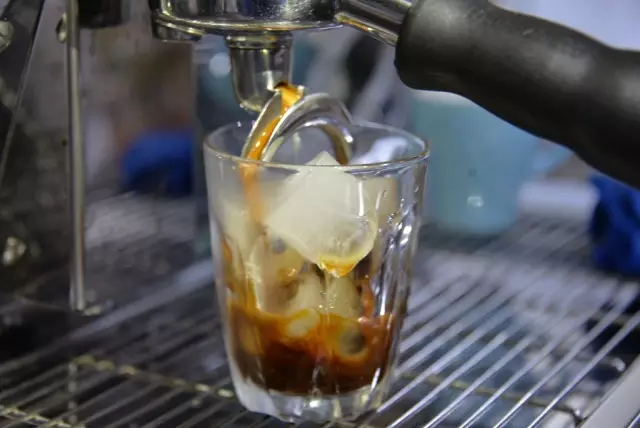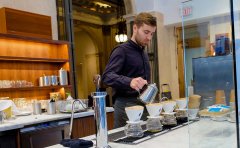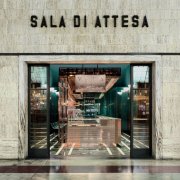Deep good text | Commercial coffee people are comrades-in-arms or bad friends in high-quality coffee?

Ask for difficulty
Boutique coffee makers occasionally intersect with commercial coffee.
People from moments or curious about boutique coffee will also come to explore the way.
What they have in common is:
1. I don't think it's necessary to use electronic coffee. -- "it tastes good based on my own experience."
2. I want to work together to roast coffee, but I know nothing about the producing areas and varieties of coffee. "I have connections, I have resources, and I have 300 cafes to contact."
3. Impatient with the need to adjust the bean mill. "one-click is the best, it's best to standardize it. You're too dependent on people."
4. People who make boutique coffee are lazy. "doing nothing is for your own enjoyment."
5. All businesses that can't make money are bullshit. "you have deified the boutique coffee."

Counter-question
In the coffee business, there are not only like-minded people, but also people who conflict with the ideas you are proud of.
Originally, this is obvious, but for a long time in the business of making boutique coffee, after abandoning many old ideas, it is the same as brainwashing, almost forgetting that there are still some people who are full of ridicule and doubt about boutique coffee.
Not long ago, an article intended to "awaken boutique coffee people" went around in moments, mainly meaning that investing in boutique coffee is because it cannot be standardized, and boutique coffee people only care about entertaining themselves, so the future is worrying.
But does boutique coffee really need an investor to control it? Does it really need a standardization that doesn't live up to its name? Is the pursuit of technology deified? Do you see the coffee man like "Ge You lying" making boutique coffee?

Answer
Answer the above five questions in turn.
1. Do you use electronic weighing to install B?
The first purpose of using electronic weighing in brewing is to control the taste, and the purpose of controlling the taste is to make the coffee palatable. The purpose of palatability is to serve the preferences of different drinkers. Lai Yuquan, who has cultivated boutique coffee in Taiwan for more than a decade, said:
The guests learned from me how to drink good beans.
After I educated my guests,
When they go to other houses, they will ask for delicious beans.
If this guest is important enough,
The manufacturer will change the baking method.
The whole market has changed.
On the contrary, this process is digital and standardized, and its standard is equivalent to customizing a standard for consumers, which runs through the links of raw beans, baking and cooking. Instead of being like Daddy Xing, for the sake of the so-called standard of production, let the individual coffee be directly watered with kalita to ensure "the same taste". But do you like this standard?

2. Many commercial coffee makers first declare that they know nothing about coffee. However, I have connections, I have a lot of resources, I just need a reliable product.
With the help of its own quality advantages, boutique coffee supplies commercial cafes with good beans with high performance-to-price ratio. Isn't it good for both sides to complement each other? However, judging from the current cases, differences in concepts will lead to many problems in cooperation.
For example, the other person will say that there is something wrong with the quality of the beans because they taste bitter and are different from those when they first worked together. Then you went to the field and found that the grinding degree of the Italian bean grinder had not been adjusted according to the development of the beans for a month, and the extraction only looked at the time rather than the flow rate and the actual extraction volume, resulting in the taste of each cup of coffee was different. and most of the extracts are bad flavors. The full sweetness of espresso extracted by the boutique is amazing.
Only supply beans, but the training of personnel can not keep up, the operation process is not controlled, high-quality beans have damaged their reputation instead. Boutique coffee is a system, not just good beans. So you have to be very careful when you cooperate.

3. The problem of standardization.
Some of the standardization issues have already been mentioned in the answer to the first question.
Boutique coffee is determined to correct and explain the immeasurable flavor and taste through the data, so a whole set of cup testing system has been established. There are unified regulations on the water temperature, grinding degree, cooking method and time measured by the cup, and even the flavor wheel is established to find common language.
Set up an international organization to score raw beans, beans with a score of more than 80 can enter the line of sight. Therefore, it is rare to see commercial coffee in the world baristas, coffee roasting and brewing competitions. Commercial coffee is considered in terms of cost and efficiency, rather than flavor quality, in terms of the purchase standard of raw beans and the standard of baking.
In brewing, the invention of smart cups, automatic hand machines and other simple tools to extract coffee. At the exhibition in March this year, teacher Han Huaizong shared with you the development of automatic hand flushing machines. In the United States, some large boutique coffee shops must use automatic hand machines. The labor cost in the United States is high, and the production volume is too large, so the automatic hand machine can be the most effective.
But it is worth noting that whether smart cups or do-it-yourself machines, people need to determine the brewing data in order to make good coffee. So people's ability is still very great. This is determined by the positioning of boutique coffee itself, responsible for quality and taste, rather than efficiency like commercial coffee.

4. "the person who makes fine coffee is lazy" is really a disaster.
A real boutique cafe owner is very tired.
Adjust the taste parameters every day, chat with guests while making coffee to get personalized data, maybe go home to bake a few pots of coffee in the evening, teach every week, free sharing meetings, really too busy to pay attention to the style. Lai Yuquan baked beans for ten hours every day, and dinner was directly changed to midnight snacks.
All the real boutique coffee people we know are high-profile people and low-key people. Love to share good things, gentle and courteous, do not pretend to be a master, do not engage in grade, you can feel free to discuss the story of a good cup of coffee with him. It embodies the essence of fine coffee in them, and that is sharing.
Those who are lazy to play with their mobile phones in the store are really not the owners of boutique cafes.

Is the boutique coffee deified?
Deification, bluntly said that the name does not live up to its name. "the coffee you make electronically may not be as good as mine." "data is not a substitute for feeling." "the flavors you're talking about are all made up, aren't they?" "you are becoming more and more minority." "you look down on people."
A cup of coffee made with an electronic scale may not be as good as you try to make, but at least you are working towards the good, for always good, not for occasional good.
It is really difficult to convey the flavor of boutique coffee. It is really not easy for ordinary Chinese to accept that it is necessary to drink a single product while holding its nose. From passive coffee drinking to active coffee drinking is a process from consumers to enthusiasts, which needs a lot of help. Both Jian Jiacheng and Huang Baikun mentioned in interviews that they would give guests coffee, and maybe one of them hit the taste and opened the taste buds, thus raising the taste of coffee to a higher level.
Boutique coffee deserves respect for its cleanliness and health. Judging from the frequent gestures of commercial coffee to boutique coffee, boutique coffee is expanding its influence in the mainland, but the worry is that many people have not yet had a chance to drink such a good cup of coffee. Because this kind of coffee often appears in an inconspicuous small shop, the environment will be discounted, and it is not suitable to gather in a cramped situation. Only enthusiasts know their location.
In addition, the price of coffee is generally on the high side. The main reason is that when we purchase raw beans, the quantity is small, the price is not dominant, the market is not big, and the price is naturally not cool enough. However, many coffee makers are aware of this problem and begin to try their best to reduce costs and attract customers with low price and high quality. It is said that Taiwan does the same thing. Coffee is as cheap as milk tea and tastes good. Would you like a cup?
If there are a lot of these little shops, they will form a starry sky and become a force to compete with commercial coffee, because coffee lovers gather here, which is much more powerful than people who drink in the environment. The most specific example is Taiwan.

The end.
In the final analysis, sharing is where life lies. This is indeed not enough.
The investor of boutique coffee must be a person who knows the industry, and then a businessman. Only in this way can we know how to operate and how not to take detours. Because its position is fundamentally different from that of commercial coffee, it is a differentiated partner.
But then again, boutique coffee itself is famous for being small and fine, and investors want to expand, expand and standardize, which is a conflict. It seems that only fine coffee industries unite and burn slowly with the power of spark, until "the whole world is spread by the fire of fine coffee" (Lai Yuquan Malaysia sharing meeting).
At the same time, thank you for the long history of commercial coffee.
Important Notice :
前街咖啡 FrontStreet Coffee has moved to new addredd:
FrontStreet Coffee Address: 315,Donghua East Road,GuangZhou
Tel:020 38364473
- Prev

Apocalypse of Blue bottle Coffee | the glory and price of moving from a street stall to an international market
The physical store of Blue bottle Coffee in San Francisco. Photo / Joshua Rainey Photography@Shutterstock February 2014 Blue bottle Coffee opened in Tokyo, starting in San Francisco, the Blue bottle, known as the "Apple of the coffee industry", officially went international, giving the world a new understanding of the coffee culture rooted in San Francisco. The Blue bottle has swept the media and social networking sites, San Francisco and New Zealand.
- Next

Coffee shop design appreciation: deluxe exquisite espresso bar
VyTa Santa Margherita in Florence is a well-designed espresso bar located in the first-class waiting room of the former Notre Dame Cathedral Railway Station sala di attesa, a masterpiece of the Italian rational architectural design Giovanni Michelucci in the 1930s. Colli has great respect for the design of this century and carefully uses the original purpose of the precision machining space of materials.
Related
- What documents do you need to go through to open a coffee shop? coffee shop coffee shop certificate processing process
- How to purchase Coffee beans in small Cafe how to choose a suitable supplier for domestic Coffee supply Company
- How to drink Starbucks Fragrance White Coffee? how to make Australian White Coffee? what Italian coffee beans are recommended?
- The Story of Flora Coffee: the name of Flora Coffee Bean and the implication of the Flowers on Florna Coffee
- How much does a cup of coffee cost? How much is the profit of a cup of coffee? What is the profit of the coffee shop in a year?
- Yunnan small Coffee, known as "fragrant Coffee", introduces the characteristics of Alpine Arabica Coffee producing areas in Yunnan, China
- 2023 latest Starbucks full menu price list how much is a cup of Starbucks coffee what is better to drink the most popular hot and cold drinks recommended
- Starbucks different kinds of Coffee Price list Starbucks menu 2023 Top Ten Best drinks in Starbucks
- Starbucks Spring praise Comprehensive matching Coffee Bean theme Story Packaging implication and taste description
- The cost of a cup of coffee latte American coffee cost price and selling price

